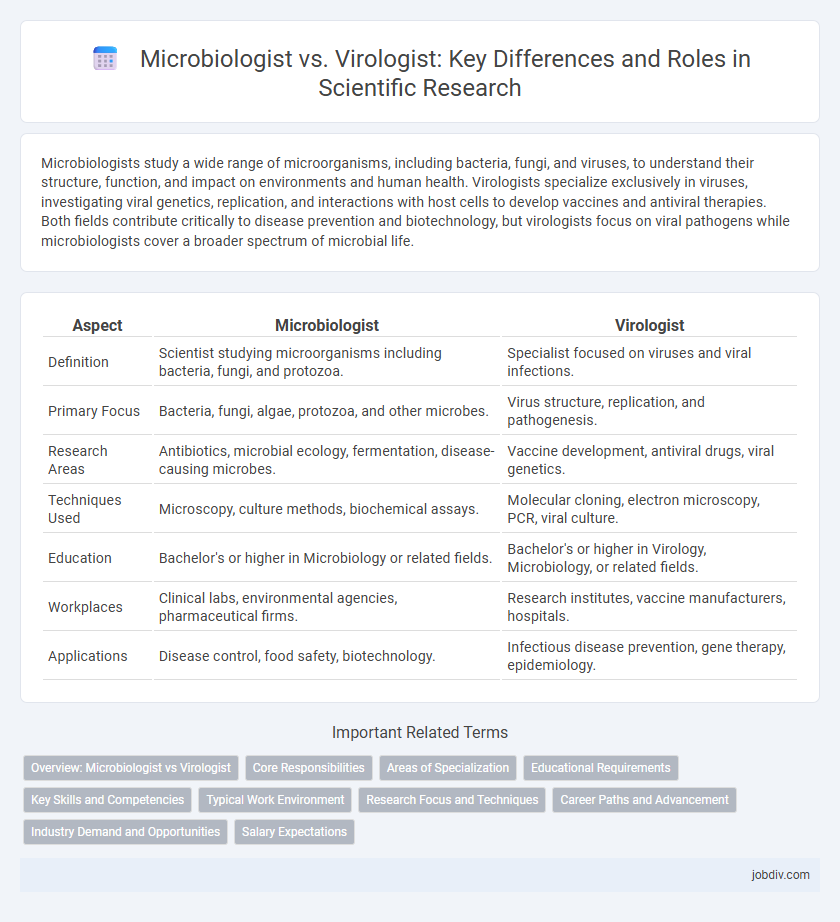Microbiologists study a wide range of microorganisms, including bacteria, fungi, and viruses, to understand their structure, function, and impact on environments and human health. Virologists specialize exclusively in viruses, investigating viral genetics, replication, and interactions with host cells to develop vaccines and antiviral therapies. Both fields contribute critically to disease prevention and biotechnology, but virologists focus on viral pathogens while microbiologists cover a broader spectrum of microbial life.
Table of Comparison
| Aspect | Microbiologist | Virologist |
|---|---|---|
| Definition | Scientist studying microorganisms including bacteria, fungi, and protozoa. | Specialist focused on viruses and viral infections. |
| Primary Focus | Bacteria, fungi, algae, protozoa, and other microbes. | Virus structure, replication, and pathogenesis. |
| Research Areas | Antibiotics, microbial ecology, fermentation, disease-causing microbes. | Vaccine development, antiviral drugs, viral genetics. |
| Techniques Used | Microscopy, culture methods, biochemical assays. | Molecular cloning, electron microscopy, PCR, viral culture. |
| Education | Bachelor's or higher in Microbiology or related fields. | Bachelor's or higher in Virology, Microbiology, or related fields. |
| Workplaces | Clinical labs, environmental agencies, pharmaceutical firms. | Research institutes, vaccine manufacturers, hospitals. |
| Applications | Disease control, food safety, biotechnology. | Infectious disease prevention, gene therapy, epidemiology. |
Overview: Microbiologist vs Virologist
Microbiologists study a broad range of microorganisms including bacteria, fungi, archaea, and protozoa, focusing on their genetics, physiology, and interactions within ecosystems. Virologists specialize exclusively in viruses, investigating viral structure, replication, pathogenesis, and host immune responses to viral infections. Both fields contribute to disease prevention, diagnostics, and biotechnological applications but differ fundamentally in their targeted microorganisms and research methodologies.
Core Responsibilities
Microbiologists study microorganisms such as bacteria, fungi, and protozoa to understand their genetics, physiology, and ecological impact, often developing antibiotics and improving food safety. Virologists specialize in viruses and viral diseases, focusing on virus structure, replication, and interactions with host cells to develop vaccines and antiviral therapies. Both roles require extensive laboratory research but differ in their specific organism focus and disease control strategies.
Areas of Specialization
Microbiologists specialize in studying a broad range of microorganisms, including bacteria, fungi, protozoa, and algae, with an emphasis on their genetics, physiology, and ecology. Virologists focus specifically on viruses, investigating viral structure, replication, pathogenesis, and interactions with host cells, often targeting viral infections and vaccine development. Both fields contribute to understanding infectious diseases, but virologists are distinctly concentrated on viral agents and their molecular mechanisms.
Educational Requirements
Microbiologists typically require a bachelor's degree in microbiology or a related biological science, with advanced positions demanding a master's or Ph.D. focusing on microbial physiology, genetics, and biochemistry. Virologists, a specialized subset of microbiologists, usually pursue extensive education including a Ph.D. in virology or molecular biology, emphasizing viral structure, replication, and pathogenesis. Both fields demand rigorous training in laboratory techniques, data analysis, and research methodologies to understand microorganisms or viruses at the molecular and cellular levels.
Key Skills and Competencies
Microbiologists possess expertise in culturing, identifying, and analyzing bacteria, fungi, and protozoa, with strong skills in molecular biology techniques and environmental sampling. Virologists specialize in viral pathogenesis, genome sequencing, and diagnostic virology, with competencies in cell culture, immunoassays, and biosafety protocols for handling infectious agents. Both require proficiency in microscopy, data interpretation, and laboratory safety, but virologists emphasize antiviral drug development and viral epidemiology.
Typical Work Environment
Microbiologists typically work in laboratories within pharmaceutical companies, academic institutions, or government agencies, studying bacteria, fungi, and microorganisms in controlled environments. Virologists often operate in specialized high-containment labs, such as biosafety level 3 or 4 facilities, due to the need for strict isolation when handling infectious viruses. Both professions require sterile and secure environments to ensure accurate research outcomes and safety compliance.
Research Focus and Techniques
Microbiologists study a broad range of microorganisms including bacteria, fungi, archaea, and protists, employing techniques such as culturing, microscopy, and biochemical assays to investigate microbial physiology and ecology. Virologists specialize in viruses, focusing on viral replication, pathogenesis, and host interactions using molecular techniques like PCR, viral genome sequencing, and cell culture systems. Both disciplines utilize advanced imaging technologies and bioinformatics tools, but virology requires stringent biosafety protocols due to the infectious nature of viral pathogens.
Career Paths and Advancement
Microbiologists study microorganisms like bacteria, fungi, and protists, often working in healthcare, environmental science, or pharmaceuticals, while virologists specialize in viruses, focusing on viral structure, genetics, and disease impact. Career advancement for microbiologists may lead to roles in research management or public health policy, whereas virologists often progress into specialized virology research, vaccine development, or epidemiology. Both fields require strong foundations in biology and lab techniques, with advanced degrees enhancing opportunities for leadership and cutting-edge research positions.
Industry Demand and Opportunities
Microbiologists and virologists both play critical roles in biotechnology and pharmaceutical industries, with increasing demand driven by advances in infectious disease research and microbial biotechnology. Virologists are especially sought after in vaccine development and epidemic response sectors due to their expertise in virus behavior and genetics. Microbiologists have broader applications across agriculture, food safety, and environmental science, offering diverse career opportunities in industrial research and quality control.
Salary Expectations
Microbiologists typically earn an average annual salary ranging from $60,000 to $90,000, depending on experience and education level, while virologists often command higher salaries, frequently between $75,000 and $110,000, due to their specialized expertise in virus research. Both professions' salaries are influenced by factors such as geographic location, industry sector, and advanced degrees, with those working in pharmaceutical or government research sectors generally receiving higher compensation. Demand for virologists has increased significantly in recent years, impacting the competitive salary landscape within virology compared to general microbiology.
Microbiologist vs Virologist Infographic

 jobdiv.com
jobdiv.com